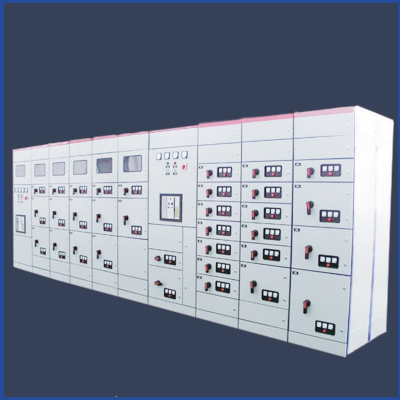在余熱發電中,低壓抽屜柜室電壓在660v一下,電流在1000A以下的控制及柜電氣設備。它是自動化控制中間環節,是聯接DCS柜與現場執行機構的一個重要的環節,它的可靠運行時發電廠提高發電量、創造高收益的重要組成部分。我們檢修和運行都要了解它的原理及操作方法及注意事項。
In waste heat power generation, low voltage drawer cabinet room voltage below 660V, current below 1000A control and cabinet electrical equipment. It is the middle link of automatic control, and it is an important link connecting DCS cabinet and field actuator. Its reliable operation is an important part of power plant to improve power generation and create high income. We need to understand its principle, operation method and matters needing attention during maintenance and operation.
一、抽屜柜按作用來分可分為饋電型柜及控制型柜
1、 Drawer cabinet can be divided into feed cabinet and control cabinet according to its function
1、饋電型柜
1. Feeder cabinet
它的主要功能就是將低壓母線的三相電壓通過柜內的斷路器往變頻器控制柜軟啟柜、站用控制屏等電氣柜供電,抽屜柜的空開具有脫扣跳閘線圈,起到保護送電線路及終端設備短路保護,切換故障電源作用,它通過主電路上串接電流互感器及配備電流繼電器,當檢測到短路電流時就使具有反時限的電流繼電器動作,驅動柜內主電路斷路器脫扣線圈,切換故障電源,短路電流越大,動作時間越短,這是反時限保護的一大特點。大電流饋電柜中,基本都裝有這種保護設備,供電電流較小的時候,可依靠斷路器本身的保護動作即可。
Its main function is to supply the three-phase voltage of the low-voltage bus through the circuit breaker in the cabinet to the soft start cabinet of the inverter control cabinet, the station control panel and other electrical cabinets. The air switch of the drawer cabinet has a trip coil, which can protect the short-circuit protection of the transmission line and terminal equipment, and switch the fault power supply. It is connected in series with the current transformer and equipped with the current relay through the main circuit, When the short-circuit current is detected, the current relay with inverse time limit will act to drive the trip coil of the main circuit breaker in the cabinet and switch the fault power supply. The larger the short-circuit current is, the shorter the action time is. This is a major feature of inverse time limit protection. When the power supply current is small, the protection action of the circuit breaker itself can be relied on.

2、控制型柜
2. Control cabinet
其主要作用就是通過斷路器及接觸器,繼電器設備組合控制電路,將中 央控制室DCS控制信號,實施對拉鏈機、關斷閥、凝結水泵等電氣設備的正反轉及抽屜柜上電機綜合保護,當電機缺相或短路堵料負荷重時,保護器常開觸點閉合切斷抽屜柜的控制回路,控制接觸器短電,切斷電源。控制柜還有繼電器與控制電路乙炔,中控電腦與設備通訊正常。
Its main function is to implement the forward and reverse rotation of zipper machine, shut-off valve, condensate pump and other electrical equipment and the comprehensive protection of the motor on the drawer cabinet through the DCS control signal of the central control room through the combined control circuit of circuit breaker, contactor and relay equipment. When the motor is lack of phase or short circuit, the normally open contact of the protector will close and cut off the control circuit of the drawer cabinet, Control contactor short circuit, cut off the power supply. The control cabinet also has relay and control circuit, and the communication between central control computer and equipment is normal.
二、低壓抽屜柜注意事項
2、 Precautions for low voltage drawer cabinet
抽屜柜一般禁止主電路負責帶電推進,直接帶負荷,所以低壓抽屜柜均帶機械連鎖機構。
Drawer cabinet generally forbids the main circuit to be responsible for live propulsion and directly load, so low-voltage drawer cabinets are equipped with mechanical interlocking mechanism.
1、推進時,要對準導軌,平衡推進(控制柜位置開關處于斷開位置,閉鎖小開關處于進出位置)。
1. When pushing, first of all, it is necessary to aim at the guide rail and balance the pushing (the position switch of the control cabinet is in the off position and the locking small switch is in the in and out position).
2、閉鎖小開關位置介紹:
2. Introduction to the position of locking small switch:
a、運行位置
a. Operating position
b、試驗位置
b. Test location
c、進出位置
c. In and out position
d、檢修位置
d. Maintenance position
3、抽屜柜操作時,一定要查看好閉鎖小開關位置在操作,不要盲目操作,以免造成設備故障。
3. When operating the drawer cabinet, it is necessary to check the position of the small locking switch, and do not operate blindly, so as not to cause equipment failure.
